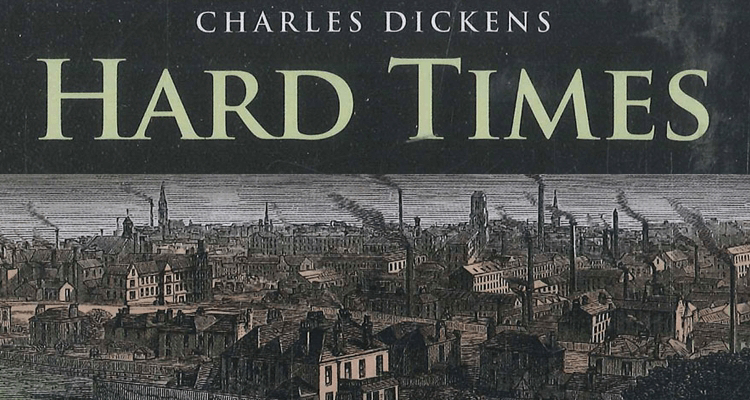Hard Time by Charles Dickens
What is Utilitarianism?
utilitarianism, in normative ethics, a tradition stemming from the late 18th- and 19th-century English philosophers and economists Jeremy Bentham and John Stuart Mill according to which an action (or type of action) is right if it tends to promote happiness or pleasure and wrong if it tends to produce unhappiness or pain—not just for the performer of the action but also for everyone else affected by it. Utilitarianism is a species of consequentialism, the general doctrine in ethics that actions (or types of action) should be evaluated on the basis of their consequences.
In the novel Hard Times, Charles Dickens connives a theme of utilitarianism, along with education and industrialization. Utilitarianism is the belief that something is morally right if it helps a majority of people. It is a principle involving nothing but facts and leaves no room for creativity or imagination. Dickens provides symbolic examples of this utilitarianism in Hard Times by using Mr. Thomas Gradgrind, one of the main characters in the book, who has a hard belief in utilitarianism. Thomas Gradgrind is so into his philosophy of rationality and facts that he has forced this belief into his children’s and as well as his young students. Mr. Josiah Bounderby, Thomas Gradgrind’s best friend, also studies utilitarianism, but he was more interested in power and money than in facts. Dickens uses Cecelia Jupe, daughter of a circus clown, who is the complete opposite of Thomas Gradgrind to provide a great contrast of a utilitarian belief.
Hard Times is Dickens’ most biting fictional critique of these moral principles and their consequences. The central utilitarian character in Hard Times is Thomas Gradgrind, a school board superintendent and father who forces the children under his mandate to memorize facts and statistics. The children are encouraged to maximize utility through their actions by basing their decisions on selfish, cold calculation. In turn, the children are punished for enjoying artistic entertainment such as storybooks about fairies and watching circus performers. With lives dominated by facts and void of art, the children are frustrated and discontented. Gradgrind’s children ultimately grow to find that the utilitarian system of ethics fails them when they are confronted with the complexity of justice and emotions.
Dickens uses Thomas Gradgrind to demonstrate exactly how a basic philosophy of rationality self-interest. Thomas Gradgrind has faith that human nature can be restrained, calculated, and ruled completely by facts. Certainly, his schooling attempts to turn young children into tiny machines. Dickens’s main goal in Hard Times was to exemplify the risks of letting humans become nothing but machines, signifying that the lack of kindness and imagination in life would be intolerable. Louisa balms her father for only teaching her lessons on facts and nothing on life, she feels that that’s the reason she is unhappy in her marriage. “All that I know is, your philosophy and your teaching will not save me. How, father,
… middle of paper …
Mr. Gradgrind’s two oldest children, Tom and Louisa, are examples of how a utilitarian method can fail horribly. Tom and Louisa were never given the opportunity to think for themselves, experience an adventurous life, or even use their imaginations. True, they are intelligent human beings but do not have the capability to understand street smarts. Dickens uses irony as a comical device but also to show how ineffective the utilitarian method of teaching is.
Gradgrind first finds his antithesis in Sissy, a girl at his school who is adopted by the Gradgrinds when her circus-performer father abandons her. Sissy is of another world, that of the circus that is governed by art and emotion, which contrasts with Gradgrind’s school and upper-class home, governed by facts, logic and selfishness. Sissy fails, both at school and at home, to comply with the mathematical rationalizations of utilitarianism because she is empathetic and imaginative.
In this novel Dickens Shows how Thomas Gradgrind uses a utilitarian mindset to force facts in the minds of young children. “Stick to Facts” (1) Thomas Gradgrind says. Dickens use Thomas Gradgrind Teachings to show how facts alone are not enough. Dickens connives that you need other factors to consider when creating the perfect human. You need imagination, life adventure and facts alone are not enough
.
Dickens’ ultimate message is to show the value of imagination, art, and human connection in a place dominated by fact and rationality. When Tom Gradgrind’s children, Louisa and Tom face hardship because they followed their father’s utilitarian thinking, it is ultimately Sissy who will be the one who pilots change in the imaginary of the Grad grind. Sissy is a magnetic storyteller, someone who can light the spark in the minds of others that illuminates a new vision of the world. That vision might be a fantastic one of fairies and other forest spirits, or of a different, more compassionate future. We see this in Sissy’s undying hope that her father might still come back home to her one day. She has faith in a better tomorrow that is based on love, not material improvement. Dickens was in fact outlining these anti-utilitarianist experiences in his humanistic stories, and honoring art as the form of defense that can lift humanity out of the dregs of reductivism.




No comments:
Post a Comment